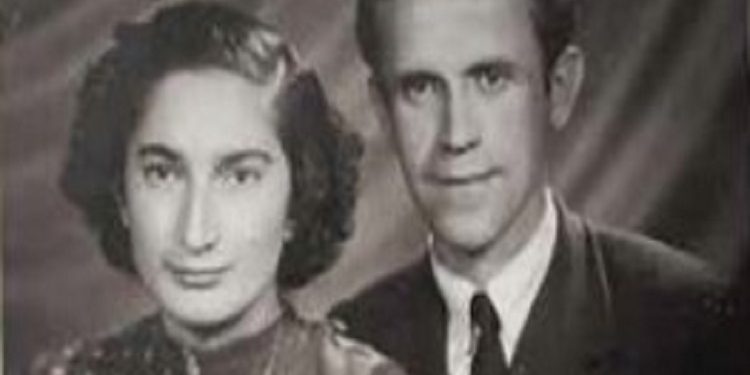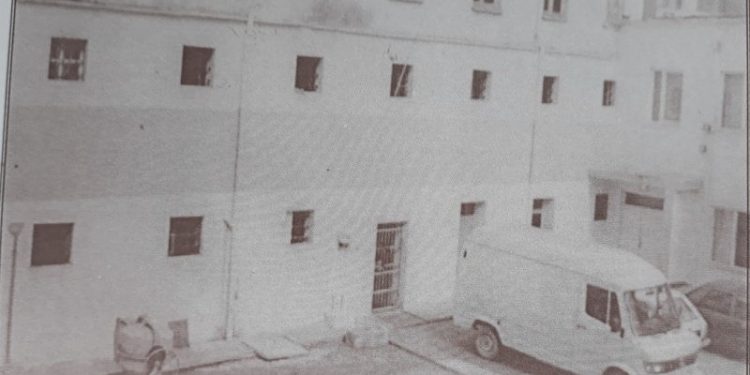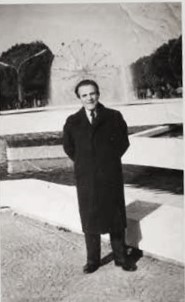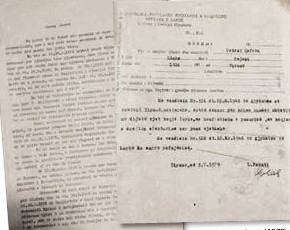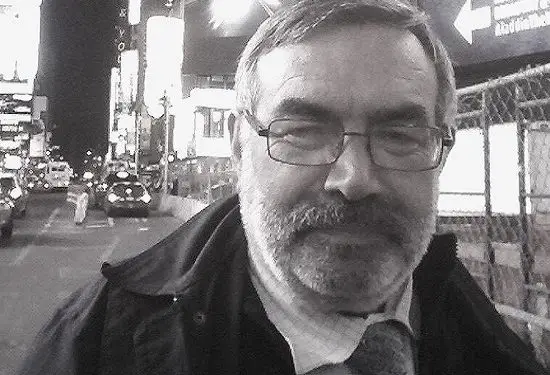By Joana Doda & Prof. Asst. Dr. Albert P. Nicholas
The first part
– The persecution of Albanian scientists, in the years 1945-1955; the connection between science and ideology – the case of the persecution of engineer Petraq Qafoku! –
METHODOLOGY
Memorie.al / In the initial part, the analysis will have a philosophical approach, to clarify the connection between ideology and science, according to the model of Marxist philosophy, and on the other hand, a critical approach will be made to this current, based mainly on the work of the philosopher French Zh. Married. The Marxist vision of man and the reduction of the latter to an object will be looked at critically, despite the criticism of Mariten, who defends the human dimension of the person. In this view, we will see how the case of engineer Petraq Qafoku is handled by the communist court and the State Security and how, through violence, his knowledge is used for the “socialist good”.
As an emblematic case of the misuse of science by Marxist ideology, we will also see that of the Soviet scientist Lysenko, who, with the support of Stalin, organizes an unprecedented violence against Soviet scientists based on the idea that a geneticist like Mendel must have wrong scientific ideas, since he was a priest.
In the next part, which is also the main part of the study, the methodology of historical anthropology will be followed, through which archival documents are analyzed in the light of the cultural elements present that give us the proper support to deepen the analysis. At the end, some classic elements of cultural anthropology will be treated, which consist in the analysis of the family archive of the Qafoku family and that of the Authority of Files on the figure of Petraq Qafoku.
Throughout the study analysis, the case of engineer Qafoku will be analyzed by proving through his history, the similar or common elements that the communist regime had, in the violence it used against Albanian intellectuals and scientists, with the Soviet model that it had as a point of reference. . All three of these elements of the methodology aim to clearly highlight the anthropological reasons for violence against Albanian scientists, analyzing the case of engineer Qafoku.
Entry
The issue of building socialism, if you look closely at the history of socialism in the former socialist countries, even in China today, has been and is closely related to science and the issue of technological and industrial progress. Marx, the spiritual father of communism and scientific socialism, makes a direct connection between the development of socialism and the birth of the political class of the proletariat, which in turn directly reflects the development of a large-scale industry.
According to him, the transition from manufacturing to large-scale industry brought about the development of the labor market and the concentration of a large number of workers in factories; precisely at this point capitalism brings not only its own destruction, but also the possibility of replacing it with another system. It is true that capitalism throughout its history has brought many problems of a social, economic, political, health, ecological nature, but here lies the paradox of the idea of replacing it with socialism: that any attempt to surpass it in the plan political, with the socialist model, has been even more painful in all the levels we mentioned above.
So, the alternative that many, in good faith, might have expected from socialism, has turned out to be a complete failure on the political and, moreover, on the moral level. I emphasize the moral aspect, because the communist regimes have given an extraordinary weight to the connection between technological and scientific development and morality, in the sense that industrial development “produces” a certain morality. Since the Marxist ideology bases every cultural superstructure on relations in production and the economy, and then the morality that originates from a certain economic-social model will be “good” or “bad”, depending on the model economic. So capitalism produces “bad” morality, while socialism produces “good” morality, or more precisely: communist morality.
In this view, the socialist state is the only absolute unit that includes all the other structural and super structural units, and the state itself is the creator and guardian of communist morality. From this fact, comes the violent attitude towards anyone, is it an intellectual, teacher, engineer, worker or any other person, who contradicts the communist morality.
But this fact necessarily leads us to another interesting phenomenon: since science and industrial development in a socialist country, which is inspired by communist ideals, are directly related to ideology and morality, then every intellectual or scientist who has direct technical responsibility in economic development, has as much responsibility in the moral aspect, which has to do with his relations with the state and society. The connection between industrial development and moral development in a socialist country is evidenced quite interestingly by the philosopher H. Marcuse.
In his study of Soviet Marxism, he notes the impact that the industrial development of the Soviet Union had in competition with Western capitalism and the ethical features of Soviet communism. The communist regime thinks that it is precisely the development of the industry that will bring the real freedom of the people. If there is a common thing in the Marxist philosophy of the 19th century, it lies in the fact that all Marxist currents emphasize the fact that the development of industry and technology is seen as a premise for economic and moral progress.
Based on what we stated above, the persecution of intellectuals in the Albanian communist dictatorship was dictated by the communist ideology. Regarding the ideological issue, intellectuals were an object of persecution, since the vast majority of them had studied in Western countries, not in the Soviet Union; therefore they were not “communist young people”, imbued with communist morals and ideals. Besides this fact, many eyes were educated with the sense of independence and individual freedom during their studies.
In his critical study, the researcher V. Possenti, referring to the philosophical criticism that the French philosopher Zh. Mariten, has made Marxism ideologically and in terms of the concept of freedom, affirms: “The main properties of the person are independence, ontological unity, freedom, pre-disposition for human relations through which he communicates with others and with the transcendental, under a dynamism of recognition and love. If we deny these basic qualities of the person, we are within the framework of Marxist goals that equates the person with material reality.”
This model and this denial of the person, which comes out clearly in the last part of the quote above, Albanian communism practiced since the first days of power. The intellectual, who has studied, especially in the West, is an “old man”, who must be forced and subjected to violence, until he transforms into a “new man”. However, the communist government, especially in the first ten years of power, is in a dilemma regarding the persecution of intellectuals, because on the one hand, the internal ideological call pushes the regime towards merciless persecution of them, since they constitute an ideological danger; on the other hand, it needs their knowledge, especially scientific and professional, to rebuild the economy destroyed by the war and to face poverty.
The Albanian intellectuals and scientists of the first years of the communist regime had a lot of personality and education, not only scientific, but also philosophical and political, as they had inevitably absorbed the general cultural and social spirit of the countries where they had lived and studied. This made them the subject of another element of persecution: they were not “collective people”, or rather compatible people, with the way communism conceived of man. Only the collective man, that is, the general man, is the object of Marx’s exaltation. Marxism is a new humanism, but with a basic misunderstanding about the dignity of the person, who has dignity only to the extent that the collective defines it.
Albanian scientists of the early 1940s cannot be reduced to a “collective”, they are, by their very nature and the studies carried out, distinguished from the “crowd”, the “collective”. It is precisely these last two concepts, which will be misused by the regime, in the systematic violence against scientists and “enemies of popular power”.
The experience of the Soviet Union, which the Albanian communist regime followed closely in the first years after the Second World War, has proven that scientists are violated and used by the regime, in a brutal way. I emphasize the word “used”, for the very anthropological and cultural meaning load that this word has, starting from the reasoning of Zh. Married. So, the person turns into a thing, into an object and is used as such, all his dignity is violated.
This example is closely followed by the Albanian communist leadership, starting from the line set by the communist dictator Enver Hoxha, a line which not only excludes scientists who have studied in the West, from being included in the country’s scientific governing bodies, but also requires the field use of their knowledge, without having access to the leading policy-making bodies. Only those who studied in the Soviet Union and communist countries can be appointed to the governing bodies:
“Our Institute of Sciences is new, like everything in our country. Our young cadres, who have learned in the Soviet Union and in the countries of people’s democracy, will work in it, as well as our best people of science, literature, arts, etc. Progressive scientists should work there and the unwanted elements that have nothing to do with the new science, and that even maintain a hostile attitude towards our government, should be removed from there. I think that their knowledge is not useful for the institute, which has great goals; that knowledge of theirs, if there is an opportunity, we will still use it elsewhere, but not in such an institute”.
This view defines the strategy of the Albanian communist regime, on the exploitation and persecution of scientists and intellectuals. Western-minded scientists should be used to the maximum, but they should not be given any space of power and direction. The most reliable model for Albanian communists is the Soviet one. Even there the experience of persecution is great and has already created a pattern. The most emblematic case of the persecution of scientists in the Soviet Union is the one related to the approach to genetics.
It is about the case of the geneticist Lysenko, who, with the direct support of Stalin, organized the kidnapping, internment and murder of some of the most famous Soviet scientists in the field of genetics, such as: Vavilov, Ivanov, Dubinin, Jebrak, Sashiarov, only that they had supported the theses of the “bourgeois” geneticist, Mendel. All the genetic discoveries of Gregor Mendel were rejected because they were considered as; “inventions of a priest”, as “mystical” and anti-scientific discoveries. Albanian scientists, who had graduated in Western countries, had to face the same prejudice, expressed in various forms.
Petraq Qafoku – the western-educated engineer and the process of persecution against him
In my study, about the persecution of intellectuals in the first ten years of the communist regime, I took as a case the story of engineer Petraq Qafoku. Born in the city of Berat, on July 17, 1916, in a family of merchants, who have a passion for children’s education, after graduating from high school with excellent results, his relatives, since Petraqi remains an orphan, from the age fresh, help him continue his higher studies, first in Bucharest, later at “La Sapienza” University in Rome. After completing his university studies and graduating in mining engineering, with excellent results in 1944, he decided to return to Albania, went to Berat and made himself available to work with the newly formed Provisional Government there, on the eve of the liberation of the country.
This decision to return to Albania contains in itself heroic elements, since engineer Qafoku was fully aware of the possible consequences in a communist dictatorial regime. In Italy, it was possible to get acquainted with literature describing the tragedy of the persecution in the Soviet Union. On the other hand, he, being an orphan, has no property in Albania. This fact gives a deep spiritual dimension to his decision to return to his homeland, as an expression of true love for his country. As we will see below, this fact stands out even more in a letter that engineer Qafoku addresses to the dictator Hoxha, in which he states that the thing that hurts him more than the persecution itself is the “taint of betrayal”.
After the liberation of the country, engineer Qafoku works in the central departments, which dealt with constructions and economic issues? His decision to return to Albania is quite noble and responds to a spiritual climate of many Albanian intellectuals, educated mainly in the West and who had the destiny of Albania at heart. This great interest and passion of theirs for the future of the country made them even more suspicious of the representatives of the communist regime, since the latter were mostly ill-educated people, but with political flair and ready for any compromise to take power. Suspicion naturally arose against these educated intellectuals.
Due to the great need of the regime for income in foreign currency and the existence of few enterprises that produce for export, engineer Qafoku was sent to the Mine of Selenica, at the end of 1945, to raise it to production conditions, as he was able to destroy as a result of the war. We see in this decision, the case of the regime’s extreme need for skilled professionals who can give a spirit of revival to the ruined economy. After two years of his dedicated work, he was arrested on September 18, 1947, in Tirana. This fact is included in the context of the first phase of violence, which the regime perpetrated against intellectuals.
Communist elites are almost non-existent and every success of intellectuals and scientists in the first years of the regime is seen with a lot of suspicion and fear. On the one hand, there is a great need for intellectuals, on the other hand, the regime is afraid of their success and uses the method of “kulac e karbacac”. At first, the regime gives graduates opportunities to put their knowledge into practice in important economic sectors of the country, and later, as soon as they are successful, the regime’s paranoia begins, with imprisonments and mass murders, under the pretext of sabotage. The theory of sabotage has been one of the most infamous, as it has been used as a pretext to violate the so-called “enemies of the class”, almost in all sectors of the economy, school and politics.
The violence against engineer Qafok has terrible ends, especially in the case of the investigator. Held for a year in the interrogator, to subject him to make false depositions against his colleagues, to present them as agents of foreign services, he proves an unparalleled dignity and endurance. For 24 days in a row, he was left without food and only with a small daily amount of water. The expectation of the investigation remains empty-handed: no false testimony comes out of his mouth and no document is signed by engineer Qafoku against his colleagues.
The accusation against engineer Qafok, as in most cases against intellectuals and scientists, is related to the absurdity of “sabotage”. Both in the case of the engineers of Kneta i Maliqi, and for engineer Qafoku, the ghost of sabotage appears. In the file of his conviction, which was made available to us by AIDSSH, we notice an unimaginable coordination of malice, ignorance, intrigue and treachery of the investigators, prosecutors and judges.
Of course, these anthropological dynamics are fed by the political dogmatism imposed by the government. What makes the wording of the indictment grotesque is the fact that it is clear that the regime has made the decision to punish engineer Qafok, with or without grace. This situation, in which all figures of a certain social group, have the same way of acting based on violence and the same goal to punish the accused, is defined by the French anthropologist, M. Mauss, as; “general social fact”.
During the trial of the Military Court, in the recorded minutes, the accusation of cooperation with fascism and sabotage is thrown: “The military prosecutor’s office here, with its communique, no. 242, has brought to this court the minutes kept by the Tirana State Security Section, against the defendant Petraq Qafoku, lined up and accused as well as equipped with a fascist education, during the occupation he was an Active Member of the Party Fascist. Regarding Eng. Taraskinon, Zuberin, and others, has fallen in relation to them and in every way has tried to sabotage the economic work, as per the directives of the organization of agent-saboteurs”.
Every detail of the State Security Directorate’s accusation turned out to be false and is only a function of the Party’s decision to punish engineer Qafoku at all costs. According to the paranoia of the regime, engineer Qafoku is an “old man”, he is the opposite model of the “new man”. The formation of the “new communist man” has been one of the most important ideological and anthropological goals of Albanian communism. According to the vision of Albanian ideologues, it is difficult for an intellectual to become a real “new man” and for this reason, scientists and intellectuals must be on the most difficult front of work (in practice!), since they are “infected ”, from the theory they received in Western schools.
So, this close connection between theory and practice, announced and actualized in communist countries (including Albania), helps us better understand the very close anthropological connection between practical choices and Marxist morality. The “new man” is not an intellectual man (the one who knows), but a man who is characterized by behaviors determined by communist morality (the one who does). This makes us understand that the scientist with western study experience is an “old man”, he is the opposite of the “young man”, he is a danger for communism. The instruction given by the dictator E. Hoxha to the “old man” is the basis of the work of the infamous Security Institution:
“He (the old man, my note), acts illegally, being legal, he throws the stone and hides his hand, he beats his chest, makes thunder, because he is with this regime, which he hates, he has learned to disguise and protect from storms…! He exploits, inflates, spreads all the issues that come to his hand and that fall into his ear, he incites the weaknesses of people, exploits self-criticism in his own interest, he sows confusion, anarchy, in-discipline, incites exaggerated desires, incites theft, thuggery, and he does not do these openly, because he is guarded, he lets others do it, many times preferably good people, so that they are compromised and thus increase his ranks..”!
The regime’s need for the professionalism of engineer Qafok makes the latter involved in many professional activities, where his expertise was required, starting from Kuçova and up to the Selenica Mine, but of course, great “care” had to be taken towards him, as he was considered an “old man”. For many reasons, but especially starting from ideological motives of building socialism “with our own forces” and industrializing the country, the regime introduces the country into an adventure of industrial development, which is completely unnatural for the poor conditions in which the country was located. In this adventure, although with very specific premises, Albania also entered after the end of the Second World War. The paradox of a socialist technological development model, which would bring the country out of backwardness, was presented to the Albanians as the path of truth and the construction of socialism.
Immediately after the war, the communist government of the dictator Hoxha, following the Soviet model, focused on industrial development, seeing the latter as a major hope for the construction of socialism: “The necessity of industrialization was dictated by the need to create a material-technical base brand new in the popular economy, to expand the production of goods in the country, to prepare the conditions for the reorganization of agriculture on a socialist basis, to increase the working class so that it strengthens its leadership positions. Socialist industrialization would directly serve the preservation of the victories and the development of the revolution, the construction of the socialist society”. Memorie.al
The next issue follows




